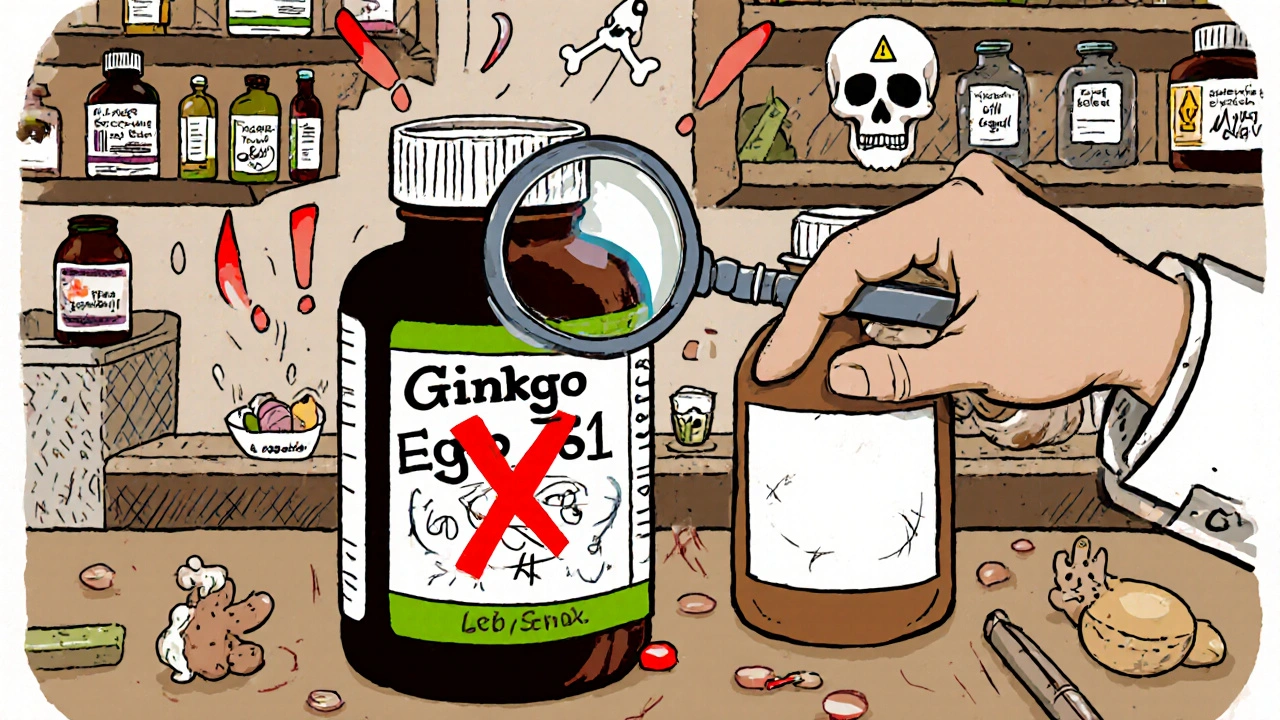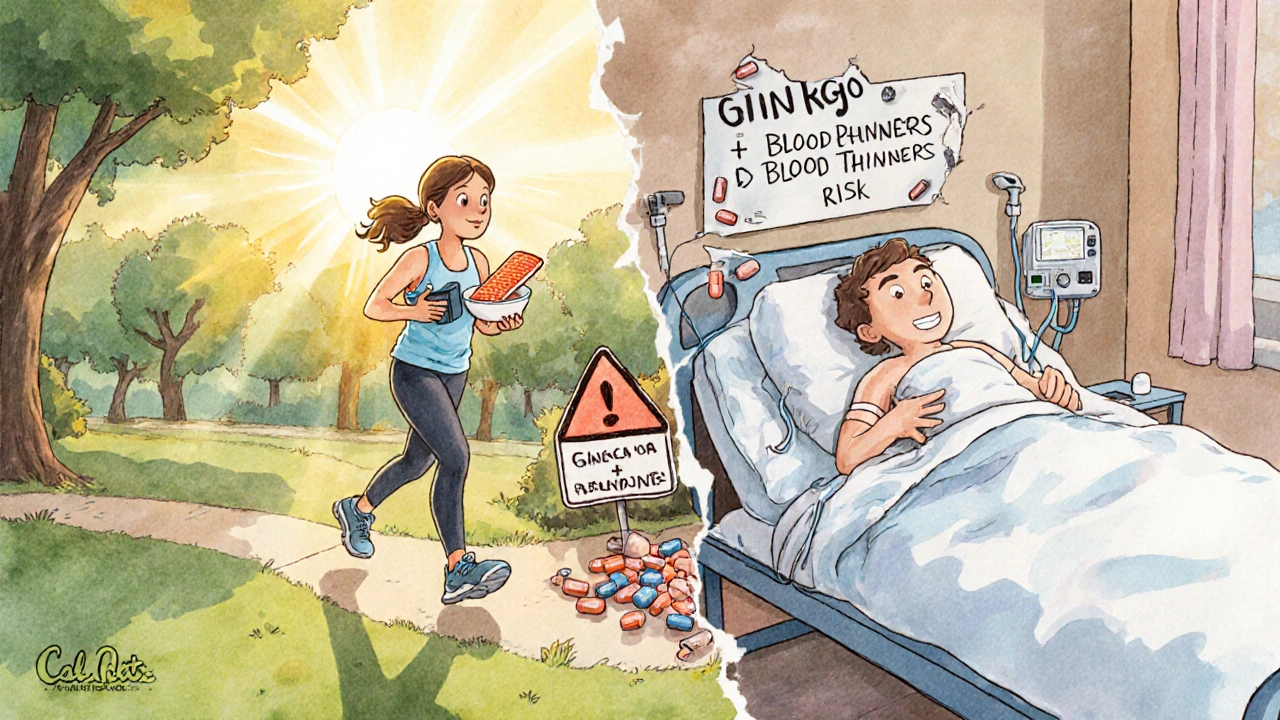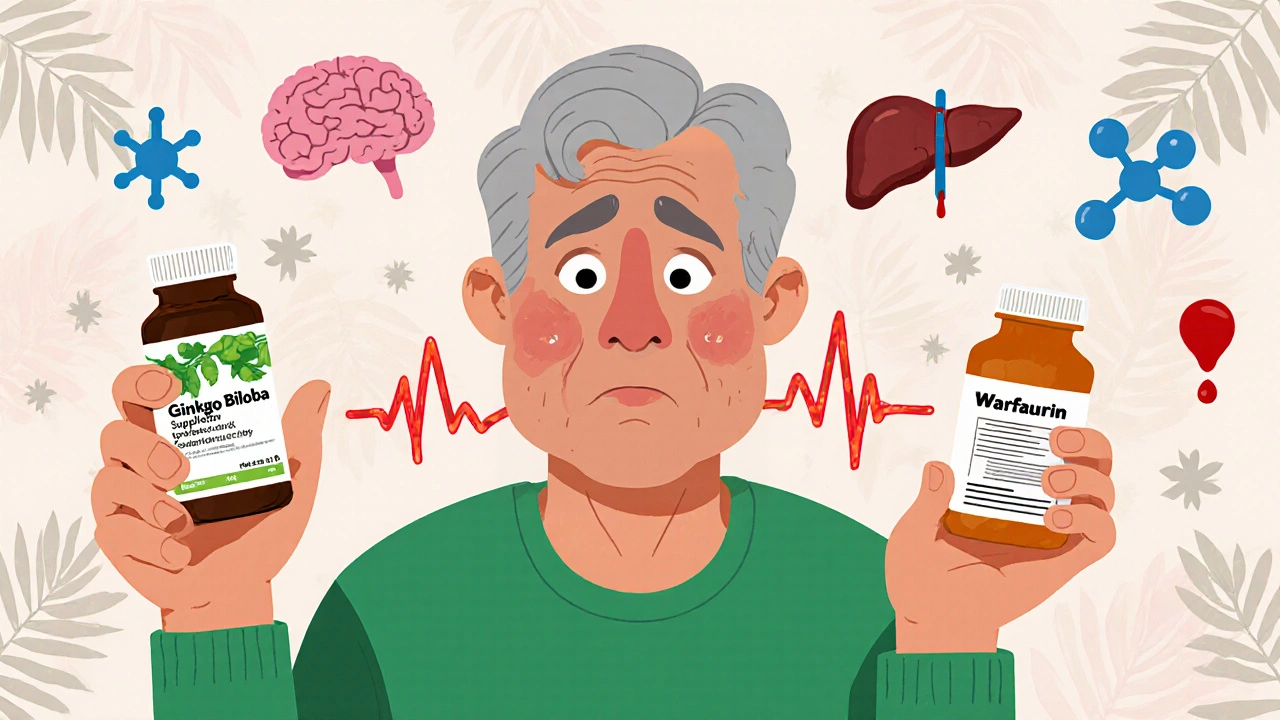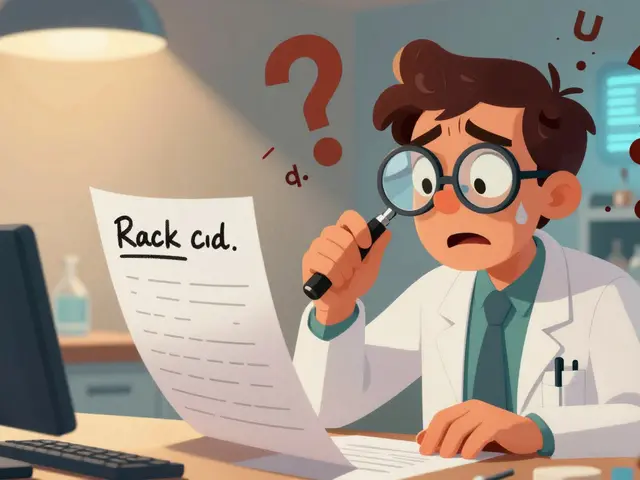Every year, millions of people in the U.S. and Europe take Ginkgo Biloba to support memory, circulation, or brain health. It’s one of the most popular herbal supplements on the market. But if you’re also taking a blood thinner - whether it’s aspirin, warfarin, clopidogrel, or a DOAC like apixaban - you might be putting yourself at risk without even knowing it.
What Is Ginkgo Biloba, Really?
Ginkgo Biloba comes from the leaves of the Ginkgo tree, one of the oldest living tree species on Earth, dating back over 270 million years. For centuries, it was used in traditional Chinese medicine. In the 1980s, a specific extract called EGb 761 became the standard form used in clinical studies and supplements. This extract contains 24% flavonol glycosides and 6% terpene lactones - the two compounds believed to give Ginkgo its effects.
Today, about 12 million Americans take Ginkgo supplements annually. It’s sold in capsules, tablets, teas, and liquid extracts. Most people take it hoping to improve memory, reduce dizziness, or boost blood flow. But here’s the catch: Ginkgo doesn’t just affect your brain. It also affects how your blood clots.
How Ginkgo Biloba Might Interact with Blood Thinners
Blood thinners work in two main ways: some stop platelets from sticking together (like aspirin and clopidogrel), and others slow down clotting proteins in your blood (like warfarin and apixaban). Ginkgo Biloba appears to interfere with both.
Research shows Ginkgo can inhibit platelet aggregation - meaning it makes platelets less likely to clump and form clots. This is similar to how aspirin works. In lab studies, Ginkgo extract also affects enzymes in the liver (CYP2C9) that break down warfarin. If those enzymes slow down, warfarin builds up in your system, increasing your risk of bleeding.
But here’s where it gets messy: controlled clinical trials don’t always agree with real-world reports. Some studies found no significant increase in bleeding when Ginkgo was taken with aspirin or warfarin. Others reported serious cases - including brain bleeds - in people using Ginkgo alongside blood thinners.
The key difference? Most of the safe studies used high-quality, standardized EGb 761 extract. The dangerous cases? Those often involved unregulated products with unknown strength, contaminants, or inconsistent dosing.
Which Blood Thinners Are Most Concerning?
Not all blood thinners carry the same level of risk when mixed with Ginkgo. Here’s what the data shows:
| Blood Thinner | Interaction Risk | Why It Matters |
|---|---|---|
| Warfarin (Coumadin, Jantoven) | High | Ginkgo may slow its breakdown, raising INR levels and bleeding risk. Case reports include intracranial hemorrhage. |
| Clopidogrel (Plavix) | Moderate to High | Both inhibit platelet function. Combined use increases bruising and bleeding risk. |
| Aspirin | Moderate | Both reduce platelet stickiness. Risk is real but less documented than with warfarin. |
| Apixaban, Rivaroxaban (DOACs) | Moderate | Case reports exist, but limited data. Still, experts advise caution. |
| Acenocoumarol | Moderate | Similar to warfarin; Ginkgo may interfere with metabolism. |
The FDA received 18 reports of possible bleeding events linked to Ginkgo between 2008 and 2020. While none were confirmed, they’re enough to raise red flags - especially when you consider how many people take Ginkgo without telling their doctor.

What Experts Actually Recommend
There’s no universal consensus, but most major medical institutions lean toward caution.
- Mayo Clinic says Ginkgo “may raise your risk of bleeding” with any blood thinner and lists aspirin, warfarin, and clopidogrel as high-risk combinations.
- GoodRx labels warfarin as “high-risk” and says to avoid Ginkgo entirely. For others, they recommend talking to your doctor first.
- Cleveland Clinic lists blood thinners as a direct contraindication - meaning you shouldn’t take Ginkgo if you’re on them.
- American Society of Anesthesiologists advises stopping Ginkgo at least two weeks before any surgery.
- PubMed review (2008) and AHFS Drug Information say the risk is mostly theoretical - no strong evidence proves harm in controlled settings.
So why the contradiction?
Because the science is split. Clinical trials use clean, tested extracts. Real life? People buy Ginkgo from health stores, online, or even from friends. Doses vary. Ingredients aren’t always listed. And many patients don’t tell their doctors they’re taking it.
What You Should Do Right Now
If you’re taking a blood thinner and considering Ginkgo - or already taking it - here’s what to do:
- Check your labels. Look at your prescription bottle. Does it say “warfarin,” “aspirin,” “Plavix,” or “Eliquis”? If yes, Ginkgo isn’t worth the risk.
- Talk to your pharmacist. Pharmacists are trained to catch these interactions. They see your full medication list. Ask them: “Is Ginkgo safe with what I’m taking?”
- Stop Ginkgo before surgery. Even if your doctor says it’s fine, most guidelines recommend stopping it 2 weeks before any procedure - dental work included. Bleeding during a tooth extraction isn’t rare with this combo.
- Don’t assume “natural” means safe. Ginkgo is a plant, but it’s a powerful one. Just like prescription drugs, it has side effects and interactions.
- Track your symptoms. If you start taking Ginkgo and notice more bruising, nosebleeds, blood in urine or stool, or headaches that won’t go away - stop immediately and call your doctor.

What About Other Herbal Supplements?
You’re not alone if you’re taking more than one supplement. But Ginkgo isn’t the only one that thins the blood. Garlic, ginger, turmeric, danshen, fish oil, and evening primrose oil all carry similar risks.
Many people think: “I’m taking garlic for heart health - it’s natural, so it’s fine.” But garlic also affects platelets. Combine it with Ginkgo and warfarin? That’s a triple threat.
If you’re on a blood thinner, treat all herbal supplements like medications. Ask your doctor about each one. Don’t just assume they’re harmless.
Bottom Line: When in Doubt, Skip It
The science isn’t 100% clear. Some studies say Ginkgo is safe. Others say it’s dangerous. But here’s what we know for sure: people have bled out - sometimes fatally - after combining Ginkgo with blood thinners. The risk isn’t high for everyone, but it’s real.
If you’re on a blood thinner and want to support your brain or circulation, there are safer options. Regular exercise, omega-3s from fish (not supplements), and managing blood pressure and cholesterol are proven, evidence-backed ways to protect your brain and heart - without risking a bleed.
There’s no rush to take Ginkgo. Your safety is more important than any supplement. If your doctor says it’s okay, get it in writing. If they’re unsure, don’t take it. Better safe than sorry - especially when your life could depend on it.
Can I take Ginkgo Biloba if I’m on aspirin?
It’s not recommended. Both aspirin and Ginkgo Biloba reduce platelet stickiness, which can increase your risk of bruising, nosebleeds, or internal bleeding. Even if you’ve taken them together without issues before, the risk builds over time. Talk to your doctor before combining them.
Does Ginkgo Biloba thin your blood like warfarin?
Ginkgo doesn’t work the same way as warfarin, but it has a similar effect. Warfarin blocks clotting proteins in your liver. Ginkgo stops platelets from clumping and may slow how fast your body breaks down warfarin. Together, they can make your blood too thin, raising the risk of serious bleeding.
How long before surgery should I stop Ginkgo Biloba?
Most experts recommend stopping Ginkgo at least 2 weeks before any surgery, including dental procedures. Some guidelines say 36 hours, but 2 weeks is the safest standard. This gives your body time to clear the compound and reduces bleeding risk during and after the procedure.
Are all Ginkgo supplements the same?
No. The only form studied in most clinical trials is EGb 761, a standardized extract. Many store-bought supplements don’t contain this exact formula - some are weaker, some are contaminated, and some don’t even have real Ginkgo. If you’re on a blood thinner, only use products that list EGb 761 on the label, or avoid it entirely.
What are the signs of bleeding from Ginkgo and blood thinners?
Watch for unusual bruising, nosebleeds that won’t stop, blood in urine or stool, vomiting blood, severe headaches, dizziness, or confusion. These could be signs of internal bleeding. If you notice any of these, stop Ginkgo immediately and seek medical help.
Can I take Ginkgo if I’m not on blood thinners but have a history of bleeding?
If you’ve had a history of bleeding disorders, ulcers, or brain bleeds, Ginkgo Biloba isn’t worth the risk - even without blood thinners. It can still affect platelet function and increase bleeding tendency. Talk to your doctor about safer alternatives for memory or circulation support.







10 Comments
Just took Ginkgo for my memory and didn’t even know it could mess with my aspirin. Holy crap. I’m stopping it tomorrow. 😅
As someone who’s been on warfarin for 7 years and took EGb 761 for cognitive support, I can confirm: the standardized extract didn’t cause issues when my INR was monitored weekly. But I told my hematologist upfront. Non-standardized? No way. The variability in supplements is wild - some have fillers that could amplify bleeding risk. Always disclose. Always test. Always prioritize clinical oversight over anecdotal ‘natural’ claims.
LOL so you’re telling me people are still falling for this ancient tree juice like it’s magic? 🤡 Ginkgo isn’t a supplement - it’s a liability waiting to bleed out someone’s brain. If you’re on blood thinners and still popping this stuff, you’re not ‘health-conscious’ - you’re just dumb. And yes, I’m talking to YOU, the guy buying it off Amazon with no label. STOP. IT.
Hey, I get it - you want to feel sharper, especially as you get older. But safety first! There are so many other ways to support brain health - walking daily, eating fatty fish, sleeping well. Ginkgo’s not worth the risk. You’ve got this - and your body will thank you for playing it safe 😊
WHY DO PEOPLE NOT LISTEN?! I had a cousin - brilliant man, 68, on Plavix - started Ginkgo because his yoga instructor said it ‘cleared the mind’ - TWO WEEKS LATER, he had a subdural hematoma. ICU. Surgery. Lost 30% of his vision. Now he’s in rehab. This isn’t ‘maybe’ dangerous - it’s a ticking time bomb wrapped in a vegan label. If you’re reading this and taking it - STOP. NOW. Call your doctor. Don’t wait for the bleeding to start.
One must, with the utmost gravity, acknowledge the epistemological chasm between empirically validated phytochemicals and the unregulated, commercially commodified herbal extracts that proliferate in the marketplace. The EGb 761 extract - a product of rigorous chromatographic standardization - possesses a pharmacokinetic profile distinct from the ad hoc, uncharacterized botanicals sold under the nebulous banner of ‘Ginkgo Biloba.’ To conflate the two is not merely irresponsible - it is an affront to the scientific method itself.
Just a quick note: I’m on apixaban, and I took Ginkgo for six months - no issues. But I checked my INR-like markers monthly, and I only used a trusted brand with the EGb 761 stamp. So… it’s not always dangerous - but it’s not always safe either. Context matters. And so does labeling. And so does honesty with your prescriber.
Of course people are taking it. They don’t read the fine print. They don’t understand pharmacodynamics. They think ‘natural’ = ‘no side effects.’ The real tragedy isn’t the supplement - it’s the healthcare system that lets this happen. If your doctor doesn’t ask about supplements, they’re not doing their job. And if you don’t volunteer the info, you’re complicit in your own risk.
Hey, I know you’re probably thinking, ‘I’ve been taking this for years and nothing happened.’ But that’s like saying, ‘I’ve driven without a seatbelt for 20 years - why change now?’ Risk doesn’t always show up right away. The damage accumulates. And when it hits? It hits hard. I’m not trying to scare you - I just want you to be informed. Talk to your pharmacist. They’re the real MVPs here.
Thanks for this post - seriously, needed it. I’m on clopidogrel and was about to start Ginkgo for focus. Now I’m not. I’m switching to blueberries and daily walks. Also, I just called my pharmacy and they flagged my Ginkgo + Plavix combo before I even bought it. Pharmacists are legends. 🙌